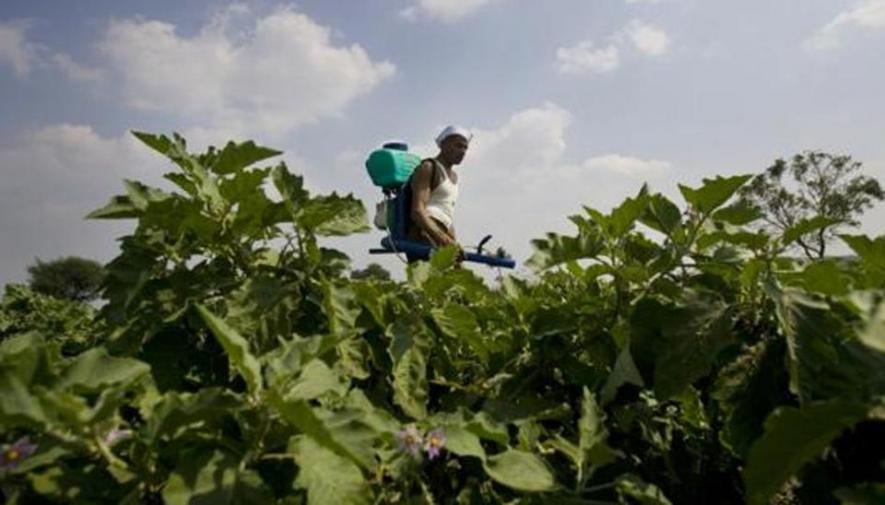Illegal Cultivation of Bt Brinjal in Haryana Confirmed, Farm Activists Demand Immediate Action

Image Courtesy: Hindustan Times
The illegal cultivation of genetically modified (GM) brinjal or Bt brinjal has been confirmed in Fatehabad district in Haryana after a plant genetic test was conducted in a central government lab.
The test was carried out after the issue was brought up by the activists from Haryana on April 23, and it is the first case in India where a farmer has laid hands on transgenic seeds of any food product whose cultivation is illegal in the country. The presence of Bt brinjal has been confirmed through the testing done by a few civil society members in a private laboratory too.
“The lab of National Bureau of Plant Genetic Resources (NBPGR) shared its report with us on Friday. We had sent two samples to this institution on April 29. The samples have tested positive, confirming cultivation of Bt Brinjal in a farm at Ratia block in Fatehabad district,” a senior official from Haryana Government was quoted as saying.
The report has already been forwarded to a committee which will make plans on weeding out those existing plants in half an acre of land and will investigate how the farmer got the transgenic variety of seeds. One of the suspicions has been that the seeds were smuggled from Bangladesh, where the cultivation of Bt brinjal is allowed.
Read More: GM Seed Use has Surged in India, But With No Better Results
In India, the commercial production of only Bt Cotton – a non-food GM crop – is allowed.
Back in October 2009, India’s biotech regulator Genetic Engineering Appraisal Committee (GEAC) had found this variety safe, and they had given permission for its cultivation. However, following the mass protests of farm activists, the then government had declared an indefinite moratorium on the commercial release of this transgenic seed in February 2010. The Maharashtra Hybrid Seeds Company Pvt Ltd (Mahyco), which developed the Bt brinjal, along with some other organisations, had conducted its trial before the moratorium on its commercial release.
“Two days after the indefinite moratorium decision was taken by the Government of India on February 9, 2010, we had written to the GEAC on February 11, 2010, demanding that all seed stocks be seized and destroyed immediately, and also that GEAC immediately notify a liability clause on the crop developer that it will be solely liable (penalty, redressal and remediation clauses included) for any leakage or contamination that could happen during the moratorium period,” said the Coalition for a GM-Free India in a letter to Dr Harshvardhan, the Union Minister for Environment, Forest and Climate Change.
Read More: GM Crops: The Societal Context of Technologies
In its 99th meeting on February 17, 2010, GEAC took note of this issue, and recorded “The Committee after detailed deliberations concluded that moratorium has not been imposed on the conduct of additional studies which would require seeds/ plant materials. It was therefore decided that directions for destruction of seeds cannot be issued at this stage. However, it was agreed that information on seed production, availability, etc, would be obtained from the proponents (M/s Mahyco, TNAU, Coimbatore and UAS Dharwad) and NBPGR may be requested to store the seed stock until a decision on the need and type of additional studies is taken. The Committee requested the Chairman, GEAC to take up the matter with Director NBPGR/ DG-ICAR.”
After that, in the 100th meeting, on May 12, 2010, GEAC discussed the issue of confiscation of all seed material from M/s Mahyco as well as TNAU Coimbatore and UAS Dharwad, in which it was recorded that National Bureau of Plant Genetic Resources (NBPGR) has agreed to accept Bt brinjal seeds, for which a separate facility has been earmarked. It is important to note that it was decided that the GEAC must obtain an affidavit from the company and institutions confirming that all the seed stock available with them has been deposited at NBPGR storage facility.
“The subsequent confirmation from reliable sources, we realise that seed confiscation did not happen, nor was our suggestion about notifying Mahyco about liability on it for any illegal cultivation discovered in the country implemented. The obtaining of an affidavit from the company and the two SAUs would not have happened either, despite this being a decision of GEAC,” the letter said.
Rajinder Chaudhary, one of the experts and a retired professor of MD University in Rohtak, who is the part of the Coalition for a GM-free India, said, “The matter should be probed thoroughly. Since the Fatehabad farmer claimed to have procured seeding from Dabwali in Sirsa district along Haryana-Punjab border, there is a strong possibility of it being cultivated in other areas of both these states.”
“It can be assumed that these entities are not responsible only if other illegal seed supply chains are established firmly by Haryana government’s investigations into the matter. We also demand that the officials of GEAC who failed in the discharge of their responsibilities, in getting the decisions of 99th and 100th meetings of GEAC should be held liable. The implementation of the indefinite moratorium imposed by the Government of India is also the responsibility of GEAC obviously,” said the letter.
Read More: ‘SC Hasn’t Upheld Monsanto’s Patent on Bt Cotton, Asked For More Evidence’
Get the latest reports & analysis with people's perspective on Protests, movements & deep analytical videos, discussions of the current affairs in your Telegram app. Subscribe to NewsClick's Telegram channel & get Real-Time updates on stories, as they get published on our website.



















